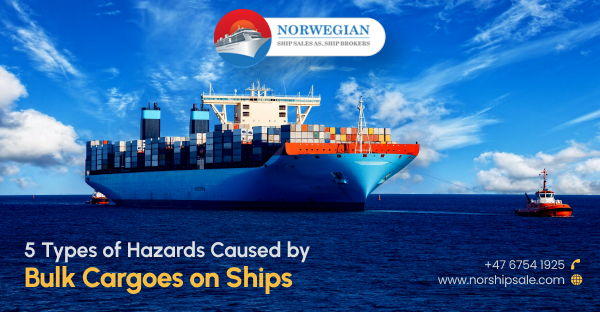Ships play an important role in international trade as they help to transport huge volumes of commodities and goods from one place to the other. For this purpose, cargo ship types such as bulk carriers, Roll-on/Roll-off (RORO) vessels and container ships etc., are used. These ships help in transporting different types of goods, such as dry bulk goods, which cover varieties of products such as cement, coal, fertilizer, sugar and iron-ore etc. Now, among these many dry bulk goods are considered ‘dangerous goods, which require proper attention from when they get loaded, during transportation till they get discharged. This is because they possess’ different types of hazards. Someone who is considering buying RORO vessels for sale must know about these risks, so to help them we have discussed the same in detail.

Cargo Shift
One of the major dangers of bulk carriers is cargo shift. This applies mainly to the vessel that transports grain cargoes. This is because grains generally settle around 2 per cent against their volume. As a result, small void spaces are created on the grain surface and this allows the grains to shift freely. Due to this free-flowing nature of the grain, the stability of the ship carrying it is reduced. To balance this trimming is done to decrease the cargo shifting. Rolling can trigger shifting of the cargo and reduce the vessel’s stability resulting in capsizing.
Cargo Liquefaction
When solid bulk cargoes transform into a fluid state the phenomenon is called liquefaction. Cargoes such as nickel ore, iron ore fines, and other mineral concentrates can undergo this phenomenon. Due to cargo compaction which is triggered by engine vibrations, ship rolling, motion and wave impact such a problem occurs as cargo agitation takes place.
Due to liquefaction flow state is developed. This is what allows the cargo to shift and slide towards one direction and as a result creates a free space, decreases the GM and reduces the stability. So, the chief officer should thoroughly review the shipper’s declaration before the bulk cargo is loaded. He/she must ensure that the cargo’s moisture content does not exceed the limit to prevent liquefaction.
Structural Damage
Loading heavy cargo can put extra pressure on the ship, which can cause structural failure. When high-density cargoes are loaded on the vessel they occupy a small area, which needs to take a large weight. Therefore, the ship’s tank top must have enough strength to carry these loads like bauxite, iron ore and etc. However, make sure that the load density of the tank top is not exceeded. Exceeding the weight can build unbearable stress in the transverse bulkheads, double bottoms, hatch covers and mainframes etc. This will cause them to bent.
Firstly, it is important not to load cargo beyond the permitted limit. And, as a ship owner if you don’t want your ship to bear the brunt then you need to buy a well-built, good-quality ship. To purchase a RORO vessel for sale, make sure to contact a good ship broker.
Contamination
Preparing the vessel for carrying the cargo is a very important part of its operations. Any lack of preparation can lead to water ingress, cargo loss or contamination. Further, dust and residues from the previous cargo can contaminate the currently loaded cargo and cause stains on the cargo. Many such instances can occur, which is unacceptable, therefore, it is important to prepare the ship well before loading cargoes.
Fire
Many bulk cargoes can pose serious fire hazards. This is because there are goods that can heat up quickly triggered by the oxidation process such as coal, cotton, and sulphur can be easily subjected to spontaneous heating. Further, coal also generates methane, a flammable gas. Therefore, if it mixes with air, it becomes an explosive mixture. Similarly, sulphur dust can easily trigger an explosion. So, proper fire precautions instructions should be observed on the bulk carriers.
Conclusion
So, you can see how bulk carrier ships can be subjected to several risks when carrying cargoes. Thus, proper precautions must be observed strictly to prevent such dangerous situations. Also, the vessel must be of good quality so that it can safely make the journey, and reach the destination. Therefore, if you are someone who is thinking of buying a RORO vessel for sale anytime soon then you must contact a good shipbroker.

